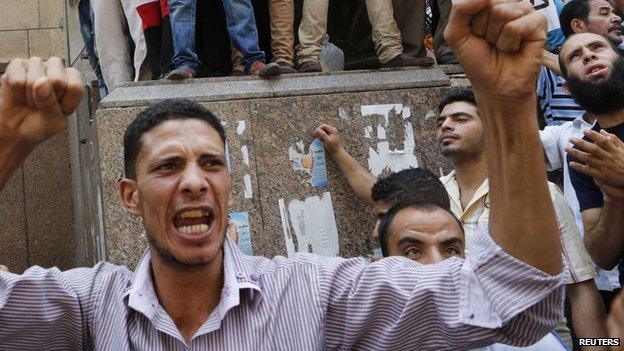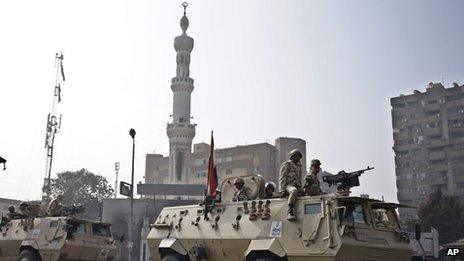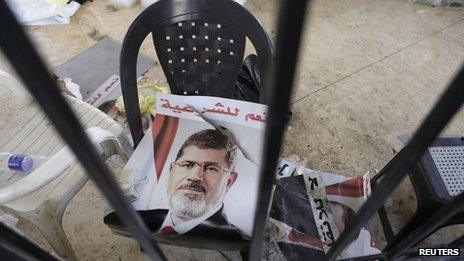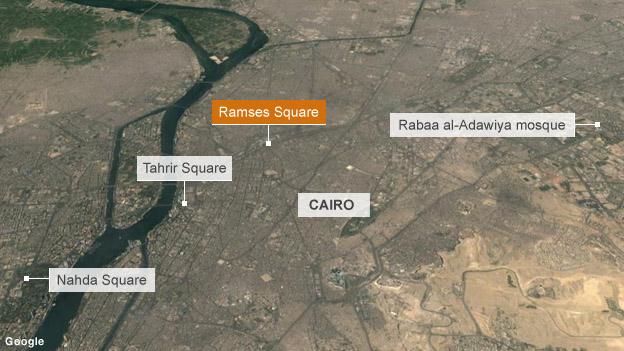Egypt crisis: How the euphoria turned to tragedy
- Published

The euphoria that followed the removal of Egypt's President Hosni Mubarak in February 2011 seems very distant now.
Egypt felt as if it had a new start. Expectations that life was about to get better bubbled around the country.
But the sky-high hopes have been overwhelmed by a combination of political failure, entrenched interests and economic crisis.
The revolution in 2011, like the other uprisings in Arab countries, was driven by the dissatisfaction and anger of a new generation.
About 60% of the population across the region was under the age of 30.
They realised that the old order had no room for them, and would never satisfy their desire to have a decent job that would give them the money to have independent lives.
The departure of hope coincided with the exponential growth in modern communications, which meant that countries could not be shut off by their leaders in the way that once was possible.
The under-30s could watch satellite TV, or look at the internet, and realise that not everyone's lives were as tough as theirs had become.
But the energy of 2011's revolutionaries was squashed by the power and organisation of established forces in Egypt, particularly the military, remnants of the old elite and the Muslim Brotherhood.

Egypt is again being governed under emergency law
In the presidential election last year, the choice in the final round was between the Brotherhood's Mohammed Morsi and a former air force general who had been Mr Mubarak's last prime minister.
Getting a candidate into the race, let alone to the winning post, was too much for the fractious, disorganised revolutionaries of Tahrir Square.
Broken promises
When Mr Morsi won the presidency, he promised to govern for all Egyptians. But he did not.
The Muslim Brotherhood had worked for power for more than 80 years. It was determined to seize its chance to reshape Egypt into the way it wanted.
Mr Morsi, the public face of the Muslim Brotherhood's top political leadership, behaved as if it had an overwhelming mandate to transform Egypt into a much more Islamist state.
Many Egyptians are pious Muslims, but that did not automatically mean they shared the Brotherhood's austere vision of the future.
To make matters worse, the Morsi administration was not very competent. It could not keep its promises about reinvigorating the economy.

Discontent over the economy and an Islamist agenda provoked June's protests
By the end of June this year, the discontent that had built in Egypt burst out into the huge protest marches that gave the military its chance to remove President Morsi.
The move was very popular with almost everyone, except the Muslim Brotherhood.
Even internationally respected liberal democrats, like the Nobel Peace Prize winner Mohamed ElBaradei welcomed what had happened.
Mr ElBaradei told me that the army had not carried out a coup d'etat.
Instead, by popular demand, it would give the Egyptian people the chance to reboot their democracy.
Different views
It has not worked out that way, even though the military and its commander, Gen Abdul Fattah al-Sisi, have plenty of backing for what they are doing.
So far it looks more like an attempt to revive the security state that sustained Mr Mubarak for 30 years.
Once again, Egypt is being governed under an emergency law that gives the state draconian powers.
Mr ElBaradei has resigned as vice-president from the government the military installed.
Hundreds are dead.
The Muslim Brotherhood and the military - and both sets of their sympathisers - both believe that the future of Egypt's next generation is at stake, and both are right. But their views of the future are very different.
The best way forward would be for all sides in Egypt - and there is a range of opinion, not two monolithic blocs - to agree a way to get people into work and to make social peace.
But that is not happening. The argument is being fought out on the streets. And that is a tragedy.
